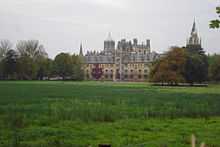David Macindoe
| Personal information | |||||||||||||||||||||||||||
|---|---|---|---|---|---|---|---|---|---|---|---|---|---|---|---|---|---|---|---|---|---|---|---|---|---|---|---|
| Full name | David Henry Macindoe | ||||||||||||||||||||||||||
| Born |
1 September 1917 Eton, Buckinghamshire, England | ||||||||||||||||||||||||||
| Died |
3 March 1986 (aged 68) Eton, Buckinghamshire, England | ||||||||||||||||||||||||||
| Batting style | Right-handed | ||||||||||||||||||||||||||
| Bowling style | Right-arm medium-fast | ||||||||||||||||||||||||||
| Domestic team information | |||||||||||||||||||||||||||
| Years | Team | ||||||||||||||||||||||||||
| 1937–1946 | Oxford University | ||||||||||||||||||||||||||
| 1937–1947 | Buckinghamshire | ||||||||||||||||||||||||||
| Career statistics | |||||||||||||||||||||||||||
| |||||||||||||||||||||||||||
| Source: Cricinfo, 1 September 2011 | |||||||||||||||||||||||||||
Major David Henry Macindoe MC (1 September 1917 – 3 March 1986) was an English cricketer. Macindoe was a right-handed batsman who bowled right-arm medium-fast. His bowling was characterised with a long run-up and a high arm action.[1] The son of Patrick Macindoe and Cicely Broadbent,[2] he was born at Eton, Buckinghamshire and educated at Eton School.[3]
First-class debut

While studying at Christ Church, Oxford, Macindoe made his first-class debut for Oxford University against Gloucestershire in 1937. He made the majority of his first-class appearances for the university prior to World War II, making 31 appearances between 1937 and 1939.[4] During this period he took 118 wickets, which came at a respectable average of 28.92.[5] His debut season was his most successful, with him taking 44 wickets at 24.40.[5] A compotent lower order batsman, he had his best season with the bat in the 1939 season, scoring 296 runs for the university at a batting average of 29.90, with a high score of 51.[6] He scored both of his first-class fifties in this season, with the score of 51 coming against the Minor Counties.[7] He played a first-class match for the Gentlemen in 1937, becoming the first freshman since Sammy Woods in 1888 to be selected for the Gentlemen.[1] He also played once for the Gentlemen of England in 1938 against the touring Australians.[4]
Prior to the war, Macindoe also played Minor counties cricket for Buckinghamshire, making his debut for the county in the 1937 Minor Counties Championship against Hertfordshire. With university commitments, he played infrequently for the county, making eight appearances.[8]
World War II and after
_-_August_5%2C_2007.jpg)
Macindoe served in World War II, by 1940 he was serving in the Royal Artillery holding the rank of 2nd Lieutenant.[9] He was awarded the Military Cross in 1945, with an announcement being made in the London Gazette on 10 April 1945.[10] He left the military in September 1946, upon resigning his commission he was honourably granted the rank of Major.[11]
After the war he returned to Christ Church, Oxford, where in 1946 he was the President of the university's Vincent's Club.[12] Returning to the university cricket team, he made ten further first-class appearances for Oxford University in 1946, the last of which came against Cambridge University.[4] In the 1946 season, he took 34 wickets at an average of 27.23, with best figures of 6/61,[5] which came against Lancashire.[13] This brought the total number of wickets he took for Oxford University to 149, which came at an average of 27.80.[14] His total number of runs scored for the university stood at 747 runs at an average of 14.94.[15] After the war he also resumed playing for Buckinghamshire, playing for the county in the 1947 season and making ten appearances in that season.[8]
In 1949, he began his teaching career at Eton College, where in his youth he had been educated. He taught English and Latin, as well as coaching cricket at the college.[1] He was part of the Territorial Army in 1952, which coincided with him heading the Combined Cadet Force at Eton.[16] His role as master of college lasted until 1960.[1] Macindoe along with Claude Taylor, who was his predecessor in the cricket role at Eton, as well as his former Buckinghamshire teammate, was the joint-author of the book Cricket Dialogue.[1] He ended his teaching career as the Vice-Provost of Eton.[1]
Personal life
Macindoe married Jane Orde, the daughter of Captain Cuthbert Orde and Lady Eileen Wellesley, in 1944. The couple had four children. Their first child, Peter, was born in 1944 and died in 1947.[2] Macindoe died suddenly at Eton on 3 March 1986, having suffered a heart attack.[1] His wife survived him by nine years.[2]
References
- ↑ 1.0 1.1 1.2 1.3 1.4 1.5 1.6 "Wisden - Obituaries in 1986". Wisden Cricketers' Almanack. ESPNcricinfo. Retrieved 2 September 2011.
- ↑ 2.0 2.1 2.2 "Binnie Family Tree". www.myweb.tiscali.co.uk/binniefamily. Retrieved 2 September 2011.
- ↑ "Teams David Macindoe played for". CricketArchive. Retrieved 1 September 2011.
- ↑ 4.0 4.1 4.2 "First-Class Matches played by David Macindoe". CricketArchive. Retrieved 2 September 2011.
- ↑ 5.0 5.1 5.2 "First-class Bowling in Each Season by David Macindoe". CricketArchive. Retrieved 2 September 2011.
- ↑ "First-class Batting and Fielding in Each Season by David Macindoe". CricketArchive. Retrieved 2 September 2011.
- ↑ "Oxford University v Minor Counties, 1939". CricketArchive. Retrieved 2 September 2011.
- ↑ 8.0 8.1 "Minor Counties Championship Matches played by David Macindoe". CricketArchive. Retrieved 2 September 2011.
- ↑ The London Gazette: (Supplement) no. 34806. p. 1366. 5 March 1940.
- ↑ The London Gazette: (Supplement) no. 37027. p. 1941. 10 April 1945.
- ↑ The London Gazette: (Supplement) no. 37736. p. 4802. 20 September 1946.
- ↑ "Vincent’s Club Presidents". www.vincents.org. Retrieved 2 September 2011.
- ↑ "Oxford University v Lancashire, 1946". CricketArchive. Retrieved 2 September 2011.
- ↑ "First-class Bowling For Each Team by David Macindoe". CricketArchive. Retrieved 2 September 2011.
- ↑ "First-class Batting and Fielding For Each Team by David Macindoe". CricketArchive. Retrieved 2 September 2011.
- ↑ The London Gazette: (Supplement) no. 39434. p. 190. 4 January 1952.